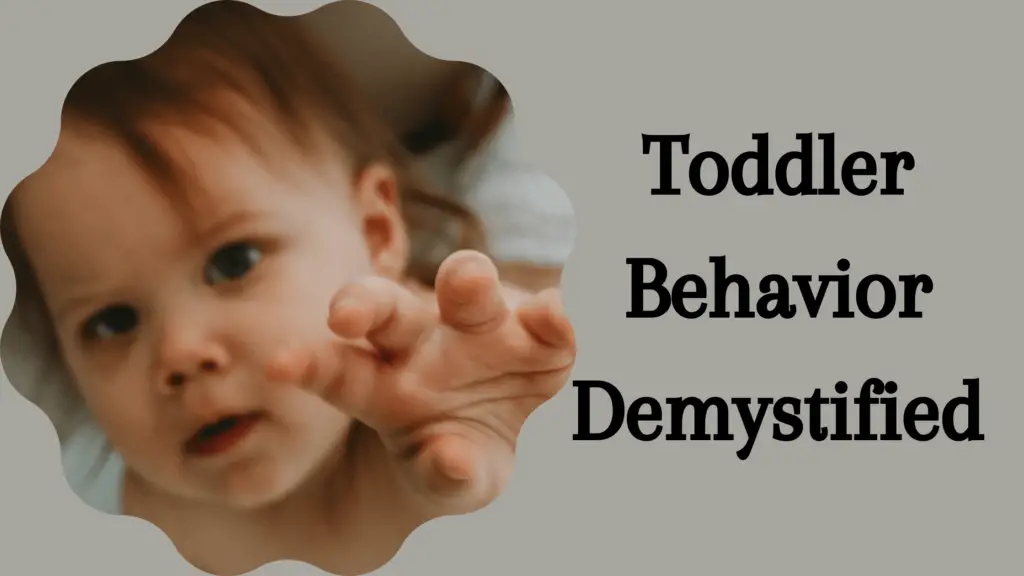Parenthood encompasses a path abundant with love, happiness, and indelible moments. Nevertheless, it also presents its fair share of trials, and among the most perplexing issues parents frequently grapple with is when their toddler appears to harbor animosity towards them. Asking the question: why does my toddler hate me? should not make you feel like you have done something wrong.
Why Does My Toddler Hate Me: Reasons
Some of the common reasons why you might feel like your toddler hates you include:
1. They’re Frustrated
Toddlers have a lot of big feelings, but they don’t always have the words to express them. This can lead to frustration, which can manifest as anger or aggression.
One of the primary reasons why toddlers often display challenging behavior is due to frustration. Toddlers are overflowing with emotions, yet their limited vocabulary frequently leaves them grappling to articulate their feelings effectively. This communication gap can result in frustration, which, in turn, might manifest as tantrums, anger, or even aggression. It’s crucial to keep in mind that these outbursts aren’t aimed at you personally; instead, they are a natural response to their struggle to express themselves adequately.
Frustration is a potent emotion that toddlers frequently encounter. During this stage, their cognitive and emotional development is rapidly advancing, while their communication skills are still evolving. Imagine being engulfed by a surge of emotions but lacking the words to convey what you’re going through. This is the everyday reality for toddlers. Frustration becomes their default reaction when they cannot effectively communicate their wants or emotions. As parents, it’s vital to recognize that these emotional explosions are not personal affronts but rather their way of conveying, “I’m facing difficulties, and I need assistance.”
2. They’re Testing Limits
Toddlers are trying to figure out where they stand in the world and how to control their own environment. This often means pushing boundaries and seeing what they can get away with.
Toddlers are undergoing a phase of rapid development, where they are actively exploring their newfound independence. They possess a strong desire to comprehend the world that surrounds them, including the boundaries and restrictions established by their parents. This exploration occasionally manifests as behavior that may appear defiant or challenging. In actuality, they are testing these limits to gain insights into their role in the world and the extent of control they can exert over their environment. It’s not indicative of animosity but rather an integral component of their cognitive and emotional maturation.
Take a moment to envision life as a toddler. You’re embarking on a journey of self-discovery, learning how to navigate your surroundings and gaining a sense of identity. It’s an exhilarating yet perplexing adventure. Testing limits is akin to conducting experiments to decipher the rules of the game. Toddlers resemble little scientists, experimenting to understand cause and effect. They push boundaries to ascertain how far they can venture and what consequences arise as a result. As a parent, your role involves providing a secure and consistent framework within which they can explore and acquire knowledge. Although it may feel as if they are challenging your authority, they are, in reality, seeking guidance and attempting to fathom the world that envelops them.
3. They’re Tired or Hungry
Toddlers are still learning to regulate their emotions and needs. When they’re tired or hungry, they may be more irritable and less likely to cooperate.
Toddlers are currently in the process of acquiring the ability to manage their emotions and physical needs. When they’re tired or hungry, their capacity to control their emotions becomes compromised. This can result in heightened irritability and a reduced likelihood of cooperating, even with the simplest of requests. It’s crucial to acknowledge that their conduct during these moments doesn’t reflect their feelings toward you but rather arises from their physical discomfort.
Consider how you react when you’re sleep-deprived or hungry. Your patience wears thin, and you may become irritable or easily agitated. Toddlers experience similar emotions but lack the coping mechanisms and self-awareness that adults have developed over time. When they’re fatigued or hungry, their ability to regulate their emotions is put to the test. They may become more susceptible to meltdowns or emotional outbursts because they are both physically and emotionally drained. Recognizing this aspect of toddler behavior can assist you in approaching such situations with empathy and offering the comfort and nourishment they require.

4. They’re Seeking Attention
Toddlers crave attention from their caregivers. Sometimes they may act out in order to get the attention they need, even if it’s negative attention.
Toddlers possess an innate need for attention and interaction with their caregivers. Occasionally, when they perceive a deficit in the attention they receive, they may employ negative behavior as a means of attracting notice. This behavior can befuddle parents, as it might appear as though the child is intentionally acting out to provoke them. However, it’s paramount to grasp that toddlers are not attempting to harm you; rather, they are simply endeavoring to fulfill their craving for connection and attention.
Picture yourself as a toddler, enveloped by a world that feels much grander and more bewildering than your small self. You view your parents as the ultimate sources of security, love, and guidance. Nonetheless, there are instances when you sense that their attention is insufficient. During these moments, you might resort to various tactics to recapture their focus, even if it entails misbehaving. For toddlers, negative attention still registers as attention, and they may not consistently differentiate between positive and negative forms of it. The impulse to seek the warmth and reassurance of their caregivers is entirely instinctual, and as parents, responding with patience and understanding holds great importance.
5. They’re Jealous of Other Siblings or Caregivers
Toddlers may feel jealous if their parents are paying attention to other siblings or caregivers. This can lead to resentment and anger towards their parents.
Jealousy is an intricate emotion, and even adults find it challenging to grapple with. Toddlers, too, can experience this emotion. When a toddler perceives that their parents are bestowing more attention or affection on other siblings or caregivers, they may harbor feelings of jealousy and resentment. This can manifest in behaviors that seem like they are directing negative emotions toward you. It’s vital to acknowledge and address these feelings while reassuring your child of your enduring love and attention.
Jealousy is a potent emotion that can be demanding for anyone to handle, particularly a toddler who is still developing their emotional coping abilities. The introduction of a new sibling, for instance, can be a momentous event that triggers jealousy and feelings of displacement in a toddler. They may struggle to comprehend why someone else is suddenly sharing the attention and love they once enjoyed exclusively. Even though their actions may give the impression of rejecting you, they are, in truth, grappling with intricate emotions and a sense of loss. Recognizing and validating these feelings can serve as a pivotal step in aiding your toddler in navigating their emotions and building resilience.
Read About: Why Do My Siblings Hate Me
6. Toddler Development and Emotions
Emotional Ups and Downs
Toddlers go through various developmental stages, and their emotions and behaviors can be unpredictable.
Comprehending your toddler’s behavior commences with acknowledging that they are progressing through a series of typical developmental stages. These stages are characterized by emotional ebbs and flows as they grapple with novel experiences, obstacles, and emotions. It’s crucial to keep in mind that these mood swings are integral to their maturation process and do not reflect their sentiments toward you.
Toddlers resemble emotional sponges, avidly absorbing everything in their vicinity while attempting to make sense of it. Their evolving brains are wired for exploration, learning, and the encounter of a wide spectrum of emotions. Nevertheless, this emotional rollercoaster can leave parents feeling bewildered. At one moment, your toddler might be brimming with affection, and in the next, they could be throwing a tantrum over something that appears trivial. These fluctuations are entirely customary and signify their developing emotional awareness. It’s of utmost importance to approach these instances with patience, as they offer valuable opportunities for learning and personal growth.
Seeking Independence
Toddlers are on a quest for independence, which can lead to a desire to assert control and test boundaries.
One of the most notable developmental milestones during toddlerhood is the emergence of a strong desire for independence. Toddlers are eager to exert control over their surroundings and make decisions for themselves. This newfound autonomy often translates into a fervent urge to explore boundaries and push limits. While this can present challenges for parents, it constitutes a pivotal step in their journey toward self-discovery and self-sufficiency.
Imagine a toddler as a miniature explorer embarking on an uncharted adventure. They are fueled by curiosity, fearlessness, and a determination to accomplish tasks independently. This pursuit of independence signals healthy development, showcasing their burgeoning self-identity and growing confidence. However, it also entails questioning authority, challenging rules, and testing the boundaries that have been set. While it may be occasionally frustrating, it’s crucial to perceive this behavior as a sign that your child is progressing towards becoming a self-reliant individual.

7. Communication Challenges
Limited Vocabulary
Toddlers may become frustrated when they can’t express themselves adequately due to their limited vocabulary.
Communication challenges are at the heart of many toddler-parent conflicts. Toddlers have a lot to say, but their vocabulary is still developing. This limitation can lead to immense frustration when they struggle to convey their needs, desires, and emotions. Their frustration may be directed outward, resulting in what appears to be anger or defiance.
Language is the bridge between thoughts, emotions, and the outside world. Imagine having a wealth of ideas and feelings but being unable to articulate them. For toddlers, this is a daily reality. They experience the world with intensity, but their vocabulary is like a locked treasure chest, and the key to unlocking it is still being forged. When they can’t find the words to express their inner world, they may resort to gestures, sounds, or emotional outbursts. Understanding their frustration and offering patient support is essential in helping them develop their language skills.
Frustration as a Communication Tool
Frustration often becomes their primary tool for expressing their needs and emotions.
For toddlers, frustration often becomes the default tool for expressing themselves. When they can’t find the right words to convey their feelings or needs, they may resort to crying, tantrums, or other challenging behaviors. These outbursts are not an indication of their hatred but rather a sign of their struggle to communicate effectively.
Frustration is a toddler’s way of saying, “I have something important to express, but I can’t find the words to do it.” These moments can be both exasperating and heart-wrenching for parents. The sight of your child in tears or the throes of a tantrum can be emotionally taxing. However, it’s crucial to recognize that these outbursts are their way of reaching out for help and understanding. It’s a plea for you to decipher their feelings and needs when they can’t do it themselves.
8. Attachment and Seeking Comfort
Understanding Their Emotional Needs
Toddlers crave emotional security and comfort from their caregivers.
Toddlers have a deep need for emotional security and comfort from their caregivers. They form strong attachments to their parents and seek reassurance through their presence and affection. When they are upset or feeling vulnerable, they may display behaviors that seem directed against you, but, in reality, they are seeking your comfort and reassurance.
Attachment is the emotional glue that binds parents and children together. It’s a profound and instinctual connection that provides a sense of safety and belonging. For toddlers, their attachment figures, often their parents, are the anchors in a world that can be overwhelming. When they are distressed or uncertain, they turn to you for the comfort and security that only a parent can provide. This reliance on you for emotional support is a testament to the strength of your bond and the trust they have in you.

Attachment Behaviors
Toddler behaviors such as clinging or wanting to be held are signs of their attachment to you.
Attachment behaviors, such as clinging, wanting to be held, or seeking physical closeness, are common in toddlers. These behaviors are not indicative of hatred but rather a testament to the strong bond they share with you. When they are distressed or uncertain, they turn to you for the comfort and security that only a parent can provide.
Attachment behaviors are a toddler’s way of saying, “I need you close because you make me feel safe.” These behaviors can manifest as wanting to be held, snuggling, or seeking physical proximity. While some parents may worry that these behaviors signal dependency, they are actually healthy signs of a secure attachment. In times of distress or uncertainty, your presence serves as a soothing balm that calms their fears and anxieties. Responding to these attachment cues with love and comfort strengthens the bonds of trust between you and your child.
The Influence of Stress and Change
Routine Disruptions
Changes in routine can be unsettling for toddlers, leading to stress and behavioral challenges.
Toddlers thrive on routine and predictability. Any significant changes in their daily routines or environments can be unsettling and lead to feelings of stress and insecurity. This stress may manifest as challenging behavior, which can be mistaken for dislike or resentment.
Imagine your toddler’s daily routine as the comforting framework that structures their world. Predictable routines provide a sense of security and stability, helping them navigate their day with confidence. However, when this routine is disrupted, such as by a change in schedule or environment, it can create a sense of chaos and unpredictability for them. This disruption can trigger feelings of stress and anxiety, which may be expressed through challenging behavior.
Family Dynamics
Changes in family dynamics, such as the arrival of a new sibling, can impact a toddler’s behavior and emotions.
Changes in family dynamics can also have a profound impact on a toddler’s behavior. The arrival of a new sibling, changes in caregivers, or other family-related changes can create feelings of jealousy, confusion, or insecurity in a toddler. These emotions can sometimes be expressed through challenging behavior.
The dynamics of a family are like the pieces of a puzzle that create a sense of belonging and identity for a toddler. When these dynamics change, such as when a new sibling enters the picture or there are shifts in caregiving responsibilities, it can disrupt the equilibrium they’ve come to know. Toddlers may experience jealousy towards a new sibling or confusion when there are changes in their primary caregivers. These feelings can be overwhelming, and their behavior may reflect their struggle to adapt to these shifts.
Read About: Why Does My Sister Hate Me
Conclusion
Understanding why your toddler seems to dislike you is a crucial step in nurturing a strong parent-child bond. It’s essential to recognize that your toddler’s behavior is not a reflection of hatred but rather a complex interplay of emotions, development, and temperament. By viewing their behavior through their eyes, responding with patience and empathy, and providing consistent boundaries, you can navigate these challenging moments with love and understanding.







